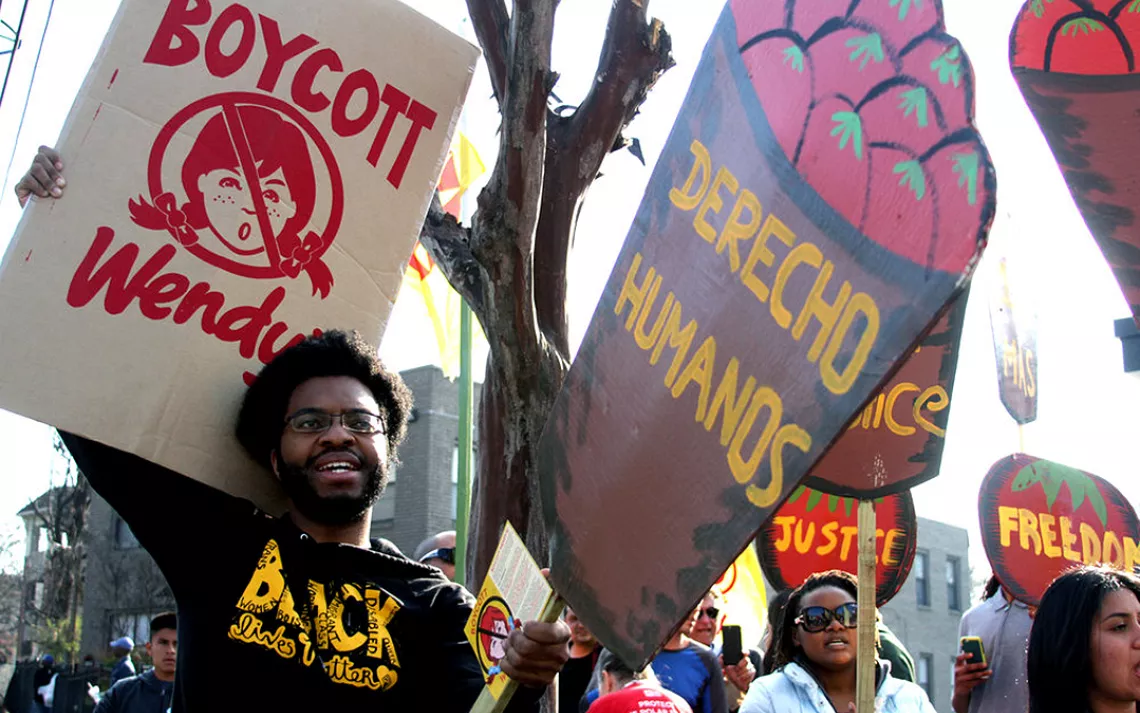A 2,000-Mile, 12-City Protest Fights for Farmworker Rights
Wendy’s accused of sourcing tomatoes from farms with human rights abuses

Protesters in Atlanta, Georgia, one of the stops on the 12-city tour | Courtesy of the Coalition of Immokalee Workers
A workplace free of physical, verbal, and sexual abuse. Clean restrooms, shade, and drinking water. Fair wages. These are rights that the acclaimed organizer Cesar Chavez battled to achieve but are still not guarantees for farmworkers in the United States or around the globe.
The Coalition of Immokalee Workers (CIW), a Florida-based human-rights group, has continued Chavez’s legacy, fighting to change abysmal farmworker conditions for over 20 years.
Its latest effort? A 2,000-mile, 12-city protest tour calling for a boycott of Wendy’s.
The CIW wants the fast-food behemoth to axe its tomato supply chain. Wendy’s currently buys tomatoes from Mexican farms charged with human rights abuses, Harper’s Magazine reported last year.
Julia de la Cruz, a Florida tomato picker, joined the CIW eight years ago. She says that there are still many farms where “if you speak out in the workplace … you might not have a job the next day,” and where wage theft is common. “You might work a full day’s work and have nothing for all you’ve done.”
Unlike its corporate brethren—McDonald’s, Burger King, Chipotle, and Walmart, among others—Wendy’s doesn’t source tomatoes solely from farms within the CIW’s Fair Food Program (FFP), a workplace watchdog that ensures humane wages and conditions. These farms follow strict codes of conduct that forbid abuses like sexual violence, child labor, and wage theft. When Florida tomato growers adopted the FFP in 2011, Wendy’s stopped purchasing tomatoes from the state.
The CIW has been boycotting the restaurant giant for a year to push it into the FPP. The protest tour caravaned through the Midwest and Southeast, with rallies, pickets, vigils, and gatherings in cities from Tampa to Minneapolis. After 11 days, the movement culminated last Sunday with a “human rights” parade in Columbus, Ohio—just a stone’s throw from Wendy’s corporate headquarters.
Nearly 500 protesters marched through rain and cold at the parade. On a stage, 19 Ohio State University students and alumni broke a seven-day fast that called for the university to cut its contract with a Wendy’s on campus.
For OSU senior Mara Momenee, abstaining from food made her think about the way we mindlessly consume it.
“That’s something that as a company, Wendy’s profits off of. Targeting young people they think are just mouths and wallets,” Momenee said. “With this fast, we wanted to send the signal loud and clear that as consumers, we care about where our food comes from.”
Wendy’s hasn’t budged so far. The company announced last October that it is “quite happy with the quality and taste of the tomatoes we are sourcing from Mexico.”
But the CIW remains confident in consumer action. In the mid-2000s, its “Boycott the Bell” national campaign pushed Taco Bell into paying tomato pickers a penny more per pound. Other companies soon fell in line. And because corporations demanded it, Florida’s tomato industry—which grows 90 percent of the country’s winter tomatoes—adopted humane practices under the FFP. Now the FFP is expanding to new crops and states, all because customers spoke up at the cash register.
“People actually do have a big power,” said Patricia Cipollitti of the Alliance for Fair Food, a CIW partner organization. “It’s what brought Taco Bell and a successive 14 corporations to the table, and it is what will bring Wendy’s.”
Cipollitti feels the success of the CIW’s efforts stems from uniting the beginning of the supply chain—farm workers—with the end—consumers.
“At the end of the day, there’s a deep connection that exists between farmworkers and consumers,” Cipollitti said. “Every time we put food on our table, it’s because a farmworker put it there.”
 The Magazine of The Sierra Club
The Magazine of The Sierra Club



